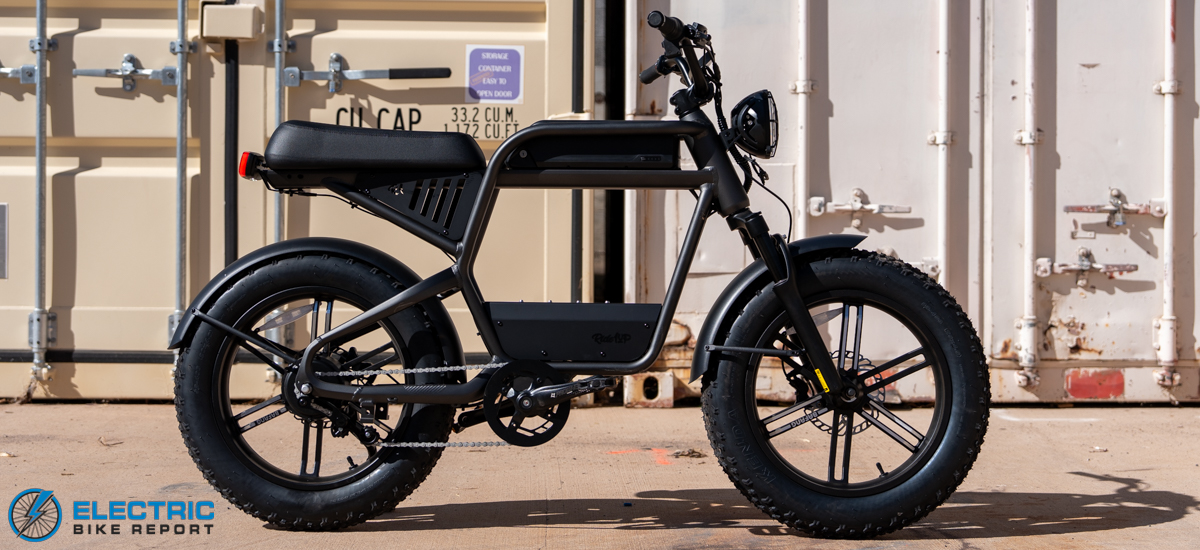Most of the e-mopeds we have reviewed run more than $2000, including the full-suspension version of the Ride1UP Revv1. There are some good reasons why they tend to be more expensive. First, the box-style frame requires both more tubing and more labor to build. Second, they feature big batteries and powerful motors and those two components often contribute half the cost of an e-bike (or more). Third, even after the cost-saving measure of leaving out the multi-speed drivetrain, more powerful brakes up the expense, as do the beefy wheels and tires.
This is why when we saw that the Ride1UP Revv1 goes for less than $2000, not only were we impressed, but we knew we’d need to put it through its paces. And it passed our speed and hill tests with flying colors. Some shoppers might not be impressed with the 44-mi. range we saw, but when we weigh that against other similarly equipped e-mopeds as well as the cost associated with spec’ing a bigger battery, we think they made a smart strategic choice. And for anyone with range anxiety, there’s always the full-suspension Revv1, which includes a battery with 33 percent more capacity.
The wide, bench-style seat and short distance to the pedals means that the Ride1UP Revv1 HT will not be the most comfortable e-bike to pedal for long distances. The low seat makes it easy to reach the ground when stopped, but it leaves the rider close enough to the pedals that it feels a bit like driving a car with the seat too far forward. Again, this points to our belief that Ride1UP expects the Revv1 to appeal most to people who don’t want to pedal much, if at all.
Shoppers considering the Ride1UP Revv1 HT who wonder whether they will fully enjoy it if it is set for Class 2 operation need not worry. Even though on throttle both PAS 3 and PAS 5 will take the rider up to 20 mph, selecting PAS 5 will result in quicker acceleration and a bit more muscle on hills.
We have criticized some e-mopeds for spec’ing brakes that resulted in a rather leisurely stopping distance. While the Ride1UP Revv1 HT came in just below our average in our brake test despite the presence of 4-piston hydraulic disc brakes and larger-than-usual rotors. We think that we might not have fully broken the pads in because when we tested the Ride1UP Revv1 FS it came to a stop more than 3 feet sooner—a result more in keeping with 4-piston brakes clamping down on 203mm rotors.
The combination of 4-in.-wide tires and a 100mm-travel suspension fork mean that riders will enjoy a very smooth experience as they roll. Even rough roads will feel smooth on the Revv1 HT.
Making the most of the Ride1UP Revv1 HT’s 750W Bafang hub motor will happen on dirt roads with the controller set to “off-road” mode. Unfortunately, most cities don’t permit e-mopeds or e-bikes to go faster than 28 mph.
The Ride1UP Revv1 HT may be the biggest surprise in the e-moped category. We called the full-suspension version of the Revv1 the best e-moped on the market, but when we consider the stunning value that the hard tail offers shoppers, we might have spoken out of turn; the Ride1UP Revv1 HT makes a very strong case for the crown of the best e-moped on the market.
Happy Riding! Make sure to let us know if you have any questions or if you think we left anything out in this review of the Ride1UP Revv1 HT down in our comments section.
.
.
.
#Ride1UP #Revv #Hardtail #Review #Electric #Bike #Report
Source link









